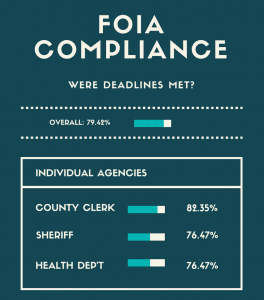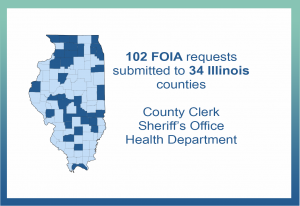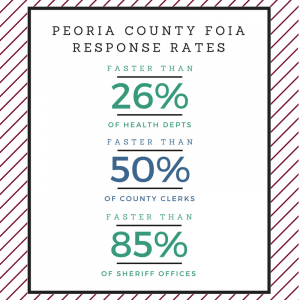The Freedom of Information Act, otherwise known as FOIA, has been granting citizens their legal right to know what goes on behind government doors since its inception in 1966. As it continues to be refined within each state legislature, the Illinois General Assembly established their statute in 1984. The Illinois law closely mirrors its federal predecessor and continues to function as a requester release system. Essentially, under FOIA laws, government officials are required to provide requesters with as much information as possible about the subject in question. Those requesters can be anybody; from curious civilians to representatives, to publishing professors and their research assistants. The latter was the case for the duration of my summer as I partnered with Bradley professor, Dr. A.Jay Wagner, as we conducted a federally-funded audit into Illinois’ FOIA process.
The reason for the audit was deceptively simple: Dr. Wagner wanted to see how well FOIA was working throughout Illinois, and subsequently, how efficient local governments were at granting the requests. Statute dictates each county has five business days to respond to each FOIA request, and as Dr. Wagner explained, the system worked correctly for almost eighty percent of counties audited. Thirty-four Illinois counties were chosen at random totaling an estimated population of 250,537 constituents.
Using a random sample of counties allowed for better data collection concerning socioeconomic differences, and gave Dr. Wagner the ability to observe inequalities in response time across multiple-sized governments.
The audit itself was simple: for each county, the county clerk, sheriff’s department, and health department were surveyed. Each department received a tailored FOIA request asking for straightforward information that should be easily accessible to them. Data was then collected based on initial response time, FOIA completion, and how much of the request was granted. Most counties, thankfully, completed the requests within the required five days. The Franklin County Clerk was the only request unfulfilled at the end of the sixty-day audit.
 “We found that in many ways the law is working quite well,” Dr. Wagner explained. “We also discovered it is failing citizens in one important facet and that these failures were contracted in Illinois’s smaller and poorer counties.”
“We found that in many ways the law is working quite well,” Dr. Wagner explained. “We also discovered it is failing citizens in one important facet and that these failures were contracted in Illinois’s smaller and poorer counties.”
The apparent socioeconomic discrimination wasn’t entirely surprising, although still disheartening. Larger counties around the Chicago area clearly had the money to fund proper training and FOIA protocols, whereas counties with smaller populations and lower income didn’t have the budget to dedicate employees solely to FOIA requests.
However, Peoria county became the beacon of light amidst a potentially discouraging result. Peoria not only had some of the first completed requests, but provided all necessary FOIA information online.
“If you’re looking for information about your local county government, Peoria county is a darn good place to live,” argued journalist Chris Kaergard.
As implied by FOIA statute, this kind of information belongs to the public. While there are nine classified exceptions to FOIA laws, many counties still refrain from publishing online compliance.
After being declared the worst city in America for people of color in 2016, Peoria has garnered a tarnished reputation. While scoring highly on a FOIA audit doesn’t mean the city is changing for African Americans by any means, it does show Peoria’s government is continuing to push in the right direction. A transparent government is a huge part of the American dream; a country claiming to be run by the people, for the people. For Peorian citizens, it’s good to know their local government is following through.

